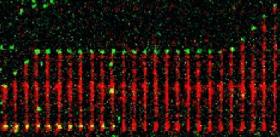Modulating the elongation of actin filaments with proteins and forces

School of Physics & Single Molecule Science, SoMS
Special Research Seminar
Guillaume Romet-Lemonne, Institut Jacques Monod
Abstract:In cells, actin filament networks are organized with diverse architectures and dynamics, in order to perform several vital mechanical functions. Formins are responsible for the generation of long actin filaments, which they form by tracking filament ends and accelerating their elongation. Using microfluidics to monitor and manipulate individual actin filaments, we show that formins accelerate filament elongation further when they are put under mechanical tension. We also show that tension decreases formin processivity, i.e. the time it acts on the barbed end before detaching. Processivity is also modulated by the competition with other end-binding proteins. Together, these results allow us to decipher molecular details of formin activity.
Bio:Guillaume Romet-Lemonne was trained as a physicist, before turning to the biophysics and biochemistry of the cytoskeleton. He now leads the group “regulation of actin assembly dynamics”, together with Antoine Jégou at Institut Jacques Monod, in Paris. Their research focuses on the biochemical and mechanical regulation of the actin cytoskeleton, through in vitro experiments with purified proteins. In particular, they have developed an original microfluidics approach for the study of individual filaments, which provides new insight into a number of molecular mechanisms.
Key results include: demonstrating that ATP hydrolysis in actin filaments is a random mechanism (Jegou et al. PLoS Biol 2011); showing formins’ ability to sense mechanical tension applied to the actin filament and increase their elongation rate (Jegou et al. Nat Commun 2013); showing the coexistence and competition of capping proteins and formins at the barbed end (Shekhar et al. Nat Commun 2015); and revealing that ADF/cofilin promotes barbed end depolymerization (Wioland et al. Curr Bio 2017). Links: www.actindynamics.net; www.ijm.fr
Date & Time: Tuesday 25 July at 4.00 pm
Venue: Lowy Cancer Research Centre, Level 4 seminar space
For information please contact: Paul Curmi. Email: p.curmi@unsw.edu.au
Back to top
Archive
- February
- March
- April
- May
- June
- July
- August
- September
- The complex lives of glia after...
- Randwick Precinct Initiating Early...
- Randwick Precinct Cancer Genomics...
- What are the mechanisms behind...
- Congratulations to new Associate...
- Medicine Learning L&T Forum
- Revolution in Breast Cancer -...
- The Split Personality of Glutamate...
- Lowy Cancer Research Centre...
- Cancer Metabolism roundtable
- Single Cell Epigenomics for...
- October
- November
